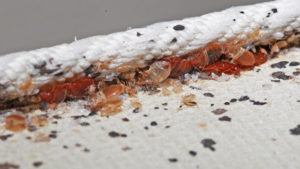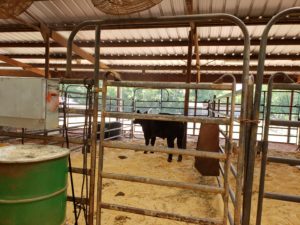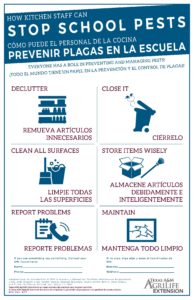In this edition of School Pest News, I thought I would share a variety of resources that I have sent out over the past month in hopes of helping everyone who might be having trouble with pests or organizing their IPM Program. Look for the hyperlinks throughout this post, plus any ad
Bed Bugs

Bed bugs produce an allergenic chemical called histamine to help them aggregate in sites like this mattress welt.
Next to head lice, bed bugs seems to be the pest that can hitch a ride with anyone or anything. When this happens most people are not sure what to do. The best thing a school, child care center, medical facility or any other public place can do is adopt a management plan that fits your situation. A few years ago, Dr. Merchant and I wrote a website post bed bug protocol for schools this is a very good reference to help IPM Coordinators and administrators develop a plan to work with students, parents, and staff when bed bugs are introduced into a school classroom. In May 2017, we also had a newsletter article on this topic Bed bugs happen: Even in school, that you can use to help educate others about this particular pest.
Don’t forget our posters Bed Bugs Bite Poster
Armyworms, tent caterpillars, asps
With all of the moisture we have had in some areas of the state there has been an increase in activity lepidoptera (butterflies and moths). Earlier this summer Wizzie Brown and I wrote a newsletter story on What Worm are You, not realizing that what we saw this summer was only the beginning. Just last week, Dr. Merchant and Dr. Lindsay Hoffman posted a blog on alert for armyworms and YouTube video on armyworms. Another odd pest is the Asp or Puss Caterpillars in some areas they can take over a tree(s) . In October 2017, our Fall Pests on the Move newsletter covered asps and fleas. If you are having trouble with this pest I do have additional resources that are not posted on the website, that I can share if you email me.
AG Science Program

These areas can become pest magnets if not managed correctly.
Over the past several years depending on where your school district is located the Ag Science program and the School IPM program have not always communicated correctly. This mostly has to do with the nature of the areas that ag barns and greenhouses are located. Especially in rural Texas, these areas are not near houses and people. However, in suburban areas that twenty years ago had a lot of open land, is now being swallowed up to houses, apartments, and shopping areas. This is placing these Ag facilities that were once isolated into areas that the public can see. For some of the school’s districts I have worked with this has brought their IPM program into question. When in truth a training of this staff on roles and responsibilities can help with the education component of the school IPM program; but, also allows everyone to know what is expected. Ag Science teachers are allowed under the FFA Charter and curriculum requirements to take care of pests on animals and plants. To help with explaining this to staff, I created a fact sheet ( AgScienceteachersandschoolIPM) that outlines the school IPM program and how these teachers can help.
In addition, I’m including these links to help with managing pests in these environments that could help.
IPM Action plan for Nuisance Birds
IPM Action plan for House and Filth Flies
IPM Action plan for Small Flies
Another IPM tactic is the control of manure these two articles storing manure and composting manure are good resources to share as well.
Training for Staff

Use this with custodial and food service workers to remind them about IPM
The Texas School IPM Rules require that the IPM coordinator is responsible that school district administrators and relevant school district personnel are provided opportunities to be informed and educated about their roles in the IPM program, reporting, and notification procedures. This includes reporting pest and pesticide complaints. At the same time, it might also require training about clutter management, cleaning practices, and other ways they can help keep the school building pest and pesticide free.
The StopSchoolPests website offers online trainings that can help you educate others at their own pace.
For some of you, this resource for housing managers can be helpful. Pass this one on to your community members StopPestsinHousing.
Our other educational posters
Stop School Pests Teachers Poster
Stop School Pests Kitchen Staff Poster English/Spanish
For your grounds applicators this educational poster for worker protection is a nice way to remind them to use their PPE Workerprotectionposterby PERCbyEngSpan
Visit our AgriLife Bookstore for variety of information and to purchase the school IPM posters in packets.

 .
.